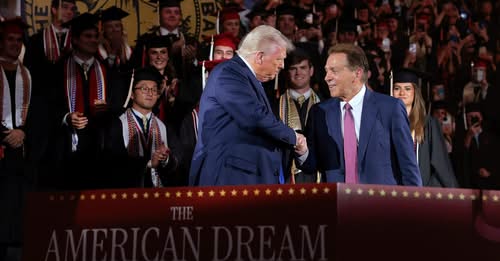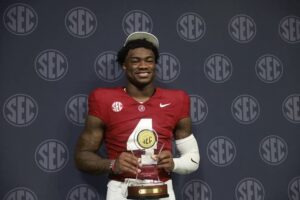
President Donald Trump is mulling over issuing an executive order to address college football’s Name Image and Likeness payments following a meeting Thursday with former Alabama coach Nick Saban, according to The Wall Street Journal.
President Donald Trump is reportedly considering issuing an executive order to regulate Name, Image, and Likeness (NIL) payments in college football. This consideration follows a recent meeting with former Alabama head coach Nick Saban, who expressed concerns about the current state of NIL deals in college sports. Saban highlighted the growing disparity in college football, where wealthier programs can offer significantly more lucrative NIL opportunities, potentially undermining the competitive balance of the sport.New York PostHouston Chronicle+1New York Post+1
NIL rights allow college athletes to profit from their personal brand, including earnings from social media, endorsements, and other ventures. These rights were granted to athletes following a 2021 Supreme Court ruling and subsequent NCAA policy changes. However, the implementation of NIL has led to a fragmented landscape, with varying state laws and institutional policies creating inconsistencies across the country. This lack of uniformity has raised concerns among coaches, administrators, and policymakers about the fairness and integrity of college sports.New York Post
Nick Saban, a prominent figure in college football, has been vocal about the need for standardized NIL regulations. He argues that the current system disproportionately benefits programs with greater financial resources, leading to an imbalance that could harm the sport’s competitive nature. Saban has called for national legislation to establish clear and consistent rules governing NIL deals, ensuring a level playing field for all programs.New York Post
In light of these concerns, President Trump is considering an executive order to address the regulation of NIL payments in college football. The proposed order would aim to create federal guidelines that standardize NIL practices, providing clarity and consistency across the nation. Supporters of this move argue that federal intervention is necessary to prevent further disparities and to protect the integrity of college athletics.New York Post
The potential executive order raises several legal and political questions. Critics argue that federal overreach into college sports could infringe upon states’ rights and the autonomy of educational institutions. Additionally, there are concerns about the enforcement of such regulations and the potential for legal challenges from various stakeholders, including universities and athletes.
On the other hand, proponents contend that a unified federal approach is essential to address the complexities of NIL and to ensure fairness in college sports. They argue that without federal guidelines, the current patchwork system will continue to create inequities and legal uncertainties.New York Post
The discussion around NIL regulation is part of a larger conversation about the future of college athletics. Issues such as athlete compensation, recruitment practices, and the commercialization of college sports are increasingly coming under scrutiny. The outcome of the debate over NIL regulation could set significant precedents for how college sports are governed and how athletes’ rights are protected moving forward.
As the landscape of college sports continues to evolve, the consideration of federal regulation of NIL payments represents a pivotal moment. The actions taken in the coming months could shape the future of college athletics, balancing the interests of athletes, institutions, and the integrity of the sport itself. Stakeholders across the college sports community will be closely monitoring developments, as the implications of these decisions will resonate for years to come.





